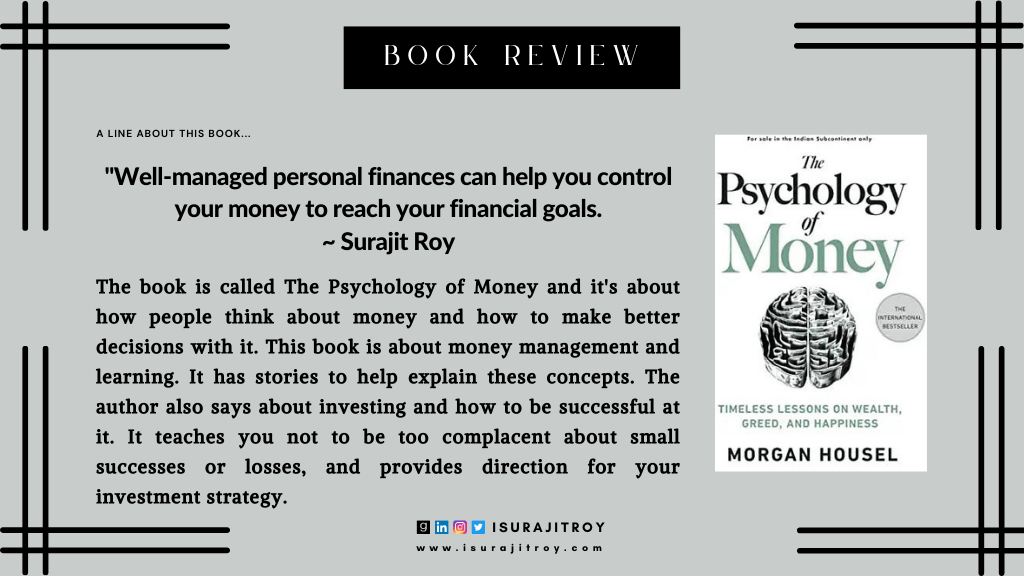
“Well-managed personal finances can help you control your money to reach your financial goals.”
Surajit Roy
“Money’s greatest intrinsic value—and this can’t be overstated—is its ability to give you control over your time.” Dive into my critical book review of “The Psychology of Money” by Morgan Housel! Delve into the intricacies of money management and decision-making, enriched with insightful stories. Housel offers valuable guidance on investing, cautioning against complacency and providing a roadmap for success. Join me on the best book summary website for a comprehensive analysis, tailored for an American audience.
Money is something we use to buy things we need or want. Money is important because it helps us get the things we need to live, like food and shelter. Money is also important because it can help us do things we want to do, like go on vacation or buy a new toy. But money isn’t everything. There are some things money can’t buy, like happiness or love. So it’s important to remember that money isn’t the most important thing in life.
Book Review Details
| Book Title | The Psychology of Money |
| Author | Morgan Housel |
| Book Genres | Non Fiction |
| Category | Analysis & Strategy |
| My Rating | 4.4 |
About The Author
Morgan Housel is a partner at The Collaborative Fund. He is a two-time winner of the Best in Business Award from the Society of American Business Editors and Writers, winner of the New York Times Sidney Award, and a two-time finalist for the Gerald Loeb Award for Distinguished Business and Financial Journalism. He lives in Seattle with his wife and two kids.
Book Introduction – The Psychology of Money
The book ‘The Psychology of Money’ deals with money and its impact upon our lives. The author, Morgan Housel, shares 19 stories exploring the mysterious ways in which people think about money. The book covers observations about our relationship with money and tells us how our financial thinking drives critical decisions in our lives. The principle of this book is that doing well with money has a bit to do with the way you are intelligent and a lot to do with the way you behave. It inspires you to live a rich life through intelligent decision-making.
Book Highlights
Luck and risk in investing
Both risk and luck occur when the outcome of something is uncertain. We normally think of risk as something bad that could happen, as if we were making a bad choice. Luck is when something good happens despite a bad choice. The reason we’re risky and lucky is because there are things we can’t control. That means that when we make decisions, we have to consider that things may not be going the way we want. When something good happens and we don’t see it coming, we call it luck. Some people think that opportunity is more important than risk for things like investment. That’s because when something lucky happens, it feels like we’re in control and we can repeat it for better results. But truly, we are not always in control, and we cannot always repeat fortunate events.
Some people are willing to take on more risk for their investments in order to get a higher rate of return. For example, an investor might put their money into stocks, which can go up or down in value, instead of U.S. Treasuries, which are considered a lower-risk investment.
Magic of compound interest
Compound interest is when the interest you earn on a balance in a savings or investing account is reinvested, earning you more interest. With compound interest, you’re not just earning interest on your principal balance. Even your interest earns interest. Compounding is when you earn interest on your principal plus the accumulated interest. This is a powerful tool to help you grow your wealth because it snowballs over time. The benefits of compounding are that you gain returns and the yields on these returns help increase your investments quickly. You can boost your returns by investing a fixed amount each month. Compounding is when money grows based on interest. If you have a savings deposit or investment (assets), compounding works in your favor because it grows your money. But if you have a liability, like money owed on a loan, compounding works against you because it grows the amount you owe.
Why do we have to wait for better investments?
If you’re thinking about buying or selling a stock, you should first consider how much risk you’re willing to take and when you’ll need the money. You should also have a financial plan that outlines your investment and financial goals for the short and long term. There are several factors that can affect when and why investors might sell a stock, and this article will look at some of them. There is no one perfect time to sell a stock. It depends on the individual’s investment strategy and goals. Some people might sell a stock when it reaches a certain price, while others might wait until it goes down in value. Some people might sell a stock as soon as they make a profit, while others might hold onto it for a longer period of time. There are many different strategies that investors use to sell stocks, and there is no right or wrong answer. It depends on the individual’s goals and preferences.
An investor must determine their time horizon, or how long they plan to keep their investment, before purchasing stocks or any type of investment. If an investor has a long-term time horizon, they can likely ride out market corrections or downturns. However, if the money is needed in the short term, such as less than one or two years, investors will likely have a different strategy for holding or selling their investment. Each investor will also have a different financial goal, depending on their age and when they need their money.
It’s called investment science
Modern Portfolio Theory is a theory that helps investors understand the relationship between risk and return. The theory of interest helps investors understand how money grows over time. The efficient market hypothesis helps investors understand how the stock market works. Investing is hard and requires a lot of discipline that most people don’t have. It’s not just about being smart, it’s about being able to see things that are not easily quantifiable and making good decisions based on them.
Conclusion
Money can help us be happier, but only if we spend it in the right way. We should buy things that create memories instead of things that are expensive. Money should not cost us our soul, relationships, dignity, health, intelligence and joy in simple things of life. ‘The Psychology of Money’ is a book about money. It is fast-paced and engaging, and will help you understand your thoughts towards money. You can finish it in a week.








